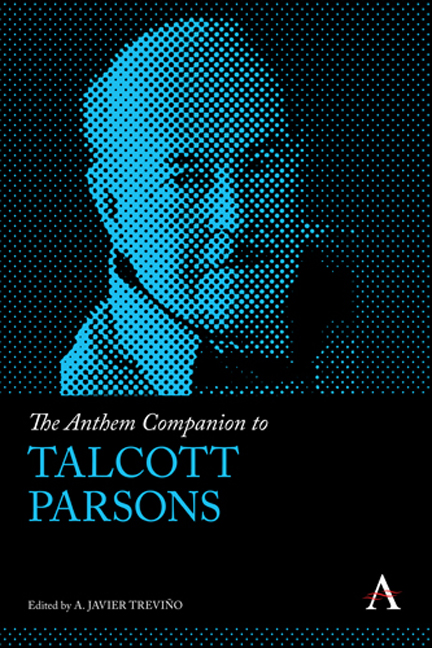Book contents
- Frontmatter
- Content
- Introduction
- Part I Political and Humanist Concerns
- Part II Social Evolution and the American Societal Community
- Chapter Seven Explaining Modernity: Talcott Parsons's Evolutionary Theory and Individualism
- Chapter Eight Talcott Parsons's Historical Analysis and the Cultural–Political Freeze in China: A Reinterpretation
- Chapter Nine Talcott Parsons and American Exceptionalism
- Chapter Ten American Society and the Societal Community: Talcott Parsons, Citizenship and Diversity
- Chapter Eleven Parsons and Nisbet: Two Versions of Sociological Communitarianism
- Contributors
- Index
Chapter Nine - Talcott Parsons and American Exceptionalism
from Part II - Social Evolution and the American Societal Community
Published online by Cambridge University Press: 22 July 2017
- Frontmatter
- Content
- Introduction
- Part I Political and Humanist Concerns
- Part II Social Evolution and the American Societal Community
- Chapter Seven Explaining Modernity: Talcott Parsons's Evolutionary Theory and Individualism
- Chapter Eight Talcott Parsons's Historical Analysis and the Cultural–Political Freeze in China: A Reinterpretation
- Chapter Nine Talcott Parsons and American Exceptionalism
- Chapter Ten American Society and the Societal Community: Talcott Parsons, Citizenship and Diversity
- Chapter Eleven Parsons and Nisbet: Two Versions of Sociological Communitarianism
- Contributors
- Index
Summary
Talcott Parsons was an American exceptionalist. He believed the United States had put its Christian tradition to a uniquely new cultural use, providing a common template for a dynamic and pluralistic society. Mostly discarding the baggage of ascription, the country had created a distinctly open societal community in which equal citizenship overrode old divisions of class and ethnicity. In America, liberal ideas of a society truly open to individual striving and oriented to future progress had finally come to fruition. As the most adaptively innovative country, it had also attained an international role that gave it both exceptional clout and exemplary status. Creative within a framework of cultural continuity, its pluralism tempered by an integrated community and intensely focused on things of the world yet inspired by high ideals, the United States had achieved an effective Modern Synthesis, unruffled by the crises once supposed to lay modernity low. With a certain pride, Parsons therefore assigned the United States the lead in the latest phase of modernization. Not surprisingly, his students report that in the class on American society he taught at Harvard University for several decades he often displayed a near-religious reverence for the United States and its future potential, which is reflected in the slightly less reverential undergraduate line about his teaching: “Every day in every way American society is getting better and better.”
This exceptionalism may have operated under the surface in Parsons's early work but certainly came to the fore toward the end of his career. He was obsessed with America, its values, its achievements and its future. Much of his theoretical work, so seemingly forbidding, served the exceptionalist cause. When he devised a theory of evolution in the 1960s, its main paths led upward to the United States. In his last years, he spent much of his time revising a manuscript on American society, focused on what he called the “societal community”—roughly the sphere of associations outside of markets and government where common membership and relations among collectivities get worked out, or more technically, “a complex network of interpenetrating collectivities and collective loyalties.”
- Type
- Chapter
- Information
- The Anthem Companion to Talcott Parsons , pp. 177 - 190Publisher: Anthem PressPrint publication year: 2016



